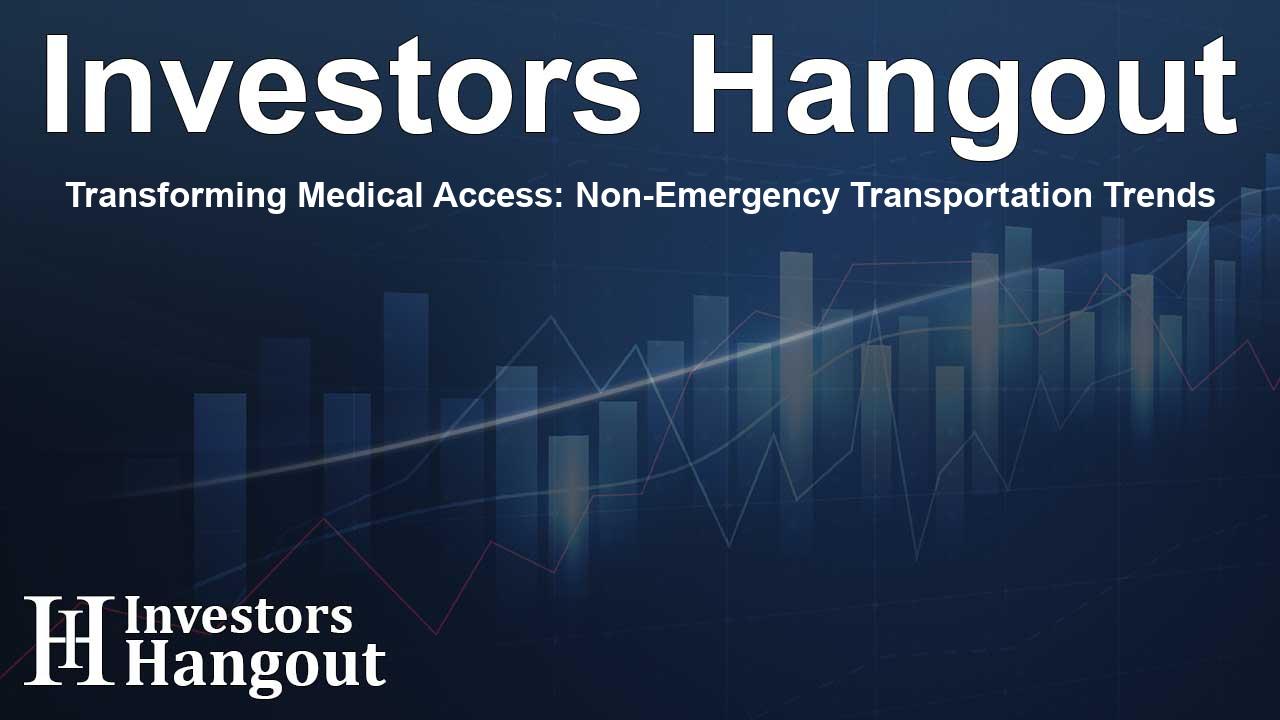Transforming Medical Access: Non-Emergency Transportation Trends

Understanding the Non-Emergency Medical Transportation Market
Recent studies reveal that the global non-emergency medical transportation market is on a rapid growth trajectory. This rise can be attributed to factors like the increasing prevalence of chronic illnesses and a burgeoning elderly population, which are vital drivers shaping this crucial sector.
Market Dynamics and Growth Projections
The non-emergency medical transportation (NEMT) sector is witnessing a remarkable expansion, with its value predicted to escalate significantly in the coming years. The market, which was valued at over $8,658 million, is projected to reach an astonishing $15,579 million by 2028. This growth represents a Compound Annual Growth Rate (CAGR) of around 9.0%, indicating how essential NEMT services have become for various demographics, particularly the elderly and individuals with disabilities.
Impact of Chronic Diseases
Chronic ailments dominate global health challenges, with statistics showing that they result in over 50% of all deaths worldwide. The Centers for Disease Control and Prevention (CDC) points out that six in ten Americans have at least one chronic condition. Conditions such as heart disease, diabetes, and cancer are particularly prevalent, necessitating regular medical appointments and treatments. Accessible transportation plays a critical role in ensuring these patients maintain their health by receiving timely medical attention.
The Growing Elderly Population
As people live longer, the world’s population is aging at an unprecedented rate. Reports suggest that the number of individuals aged 65 and older in the United States is expected to double from approximately 52 million today to nearly 95 million by 2060. This demographic shift presents a significant opportunity for NEMT services, as older adults often find themselves needing more medical assistance and transportation.
Importance of Reliable Transportation
For many elderly individuals, public transport options may not be sufficient due to mobility constraints. NEMT provides a dependable transportation solution, allowing seniors to attend vital medical appointments without the stress of securing a ride. This service is critical for ensuring that older adults have timely access to healthcare services, which is essential for managing their health conditions effectively.
Geographical Insights and Market Segmentation
As the non-emergency medical transportation market evolves, several regions are emerging as key players. North America currently holds a dominant position, while the Asia-Pacific region is anticipated to grow at the fastest rate, reflecting significant unmet needs in healthcare accessibility.
Service Types and Applications
The NEMT market is diverse, encompassing various service types, including private pay patient transportation and insurance-backed patient transit. Dialysis support, routine doctor visits, and mental health-related transport represent major applications. Among these, mental health transport is particularly vital, helping those in need access essential services without barriers.
Competitive Landscape
Several key players dominate the one. Companies like ABC Non-Emergency Medical Transportation, LLC, MTM, Inc., and AMR are notable leaders in this field. These organizations focus on incorporating innovative solutions and strategic partnerships to enhance their service offerings and reach.
Trends and Innovations in NEMT
Recent advancements in technology are reshaping how NEMT services operate. Integrating GPS tracking and electronic scheduling software enhances performance, ensuring timely pickups and drop-offs. These technological improvements are instrumental in maintaining patient satisfaction and operational efficiency within the sector.
Future Outlook and Conclusion
As the non-emergency medical transportation market continues to expand, stakeholders including healthcare providers and NEMT organizations are expected to collaborate closely to enhance accessibility. The evolving landscape will likely see further integration of modern technologies that facilitate better care delivery and patient outcomes. Embracing change through innovation and robust planning will position companies for success in this growing market, ensuring that patients receive the transportation they need to maintain their health and well-being.
Frequently Asked Questions
What is non-emergency medical transportation (NEMT)?
NEMT refers to transportation services that provide access to medical appointments for individuals who do not require emergency care.
Why is NEMT important for the elderly?
NEMT is crucial for the elderly as it facilitates access to necessary healthcare services, helping to manage chronic conditions and maintain health.
How is the NEMT market projected to grow?
The NEMT market is forecasted to grow significantly, reaching an estimated value of $15,579 million by 2028, driven by increasing demand from the aging population and chronic illness prevalence.
What technological advancements are impacting NEMT?
Technological improvements such as GPS tracking and electronic scheduling are enhancing efficiency and reliability of NEMT services.
Who are the key players in the NEMT market?
Major players in the NEMT market include ABC Non-Emergency Medical Transportation, LLC, MTM, Inc., and AMR, among others.
About Investors Hangout
Investors Hangout is a leading online stock forum for financial discussion and learning, offering a wide range of free tools and resources. It draws in traders of all levels, who exchange market knowledge, investigate trading tactics, and keep an eye on industry developments in real time. Featuring financial articles, stock message boards, quotes, charts, company profiles, and live news updates. Through cooperative learning and a wealth of informational resources, it helps users from novices creating their first portfolios to experts honing their techniques. Join Investors Hangout today: https://investorshangout.com/
Disclaimer: The content of this article is solely for general informational purposes only; it does not represent legal, financial, or investment advice. Investors Hangout does not offer financial advice; the author is not a licensed financial advisor. Consult a qualified advisor before making any financial or investment decisions based on this article. The author's interpretation of publicly available data shapes the opinions presented here; as a result, they should not be taken as advice to purchase, sell, or hold any securities mentioned or any other investments. The author does not guarantee the accuracy, completeness, or timeliness of any material, providing it "as is." Information and market conditions may change; past performance is not indicative of future outcomes. If any of the material offered here is inaccurate, please contact us for corrections.